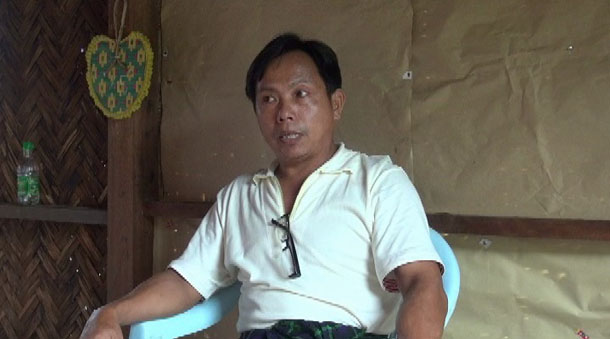RANGOON — A court in northern Burma has found an ethnic Kachin man guilty of defamation, after he accused the Burma Army of killing his 14-year-old daughter.
The verdict on Friday, from a court in Kachin State’s Hpakant Township, ends a trial that has spanned nearly 12 months and dozens of hearings. The defendant Brang Shawng was fined 50,000 kyats (US$50) for defamation, opting to pay the monetary penalty instead of serving a six-month prison sentence.
Brang Shawng wrote an open letter to President Thein Sein and lodged a complaint with the Myanmar National Human Rights Commission in September and October of 2012, respectively, seeking an investigation into the death of his daughter, Ja Seng Ing, who was killed on Sept. 13, 2012. Her father has said that she was shot dead by the Burma Army in an incident of indiscriminate fire in the Kachin State village of Sut Ngai Yang, while the Burma Army maintains that she succumbed to shrapnel wounds from an explosive device detonated by the Kachin Independence Army (KIA).
The 49-year-old was found guilty of “falsely charging any person with having committed an offense, knowing that there is not just or lawful ground for such proceeding or charge against that person,” under Section 211 of the Penal Code. The charge, brought by Maj. Zarni Min Pike, carries with it a maximum sentence of two years in prison.
“I sincerely wanted to know the truth about the death of my daughter,” Brang Shawng told The Irrawaddy on Tuesday. “I didn’t intend to harm anyone. So, I requested that the president initiate a fact-finding [probe].”
With no response from the government, a 10-member coalition calling itself the Ja Seng Ing Truth Finding Committee released a report in December 2014 detailing its own investigation into the killing, in which several witnesses provided testimony accusing Burma Army soldiers of shooting Ja Seng Ing.
Two international human rights groups condemned the verdict on Tuesday, with Amnesty International calling the charge “politically motivated and solely in retaliation for his complaint against the Myanmar Army.”
“As such, his sentence should be overturned,” Amnesty added.
Fortify Rights, a Bangkok-based rights group that has been involved in efforts by the Ja Seng Ing Truth Finding Committee to get Brang Shawng acquitted, echoed calls for a reversal of the verdict.
“The military commits abuses, controls the courts, and retaliates against those who speak out,” Matthew Smith, executive director of Fortify Rights, told The Irrawaddy. “Ongoing impunity is one of the biggest obstacles to positive change in Myanmar. The international community should redouble support for efforts to ensure accountability at all levels.”
Friday’s verdict comes as a more recent high-profile murder case in neighboring Shan State continues to unfold.
Two Kachin schoolteachers were found brutally murdered in their shared dormitory in Kutkai Township, northern Shan State, on Jan. 20. Allegations of rape and Burma Army involvement in the killings have accompanied the investigation from the outset, and the military on Jan. 28 released a statement declaring its soldiers’ innocence. The Burma Army said any accusation of a military role in the women’s deaths would be met with legal action once the results of the probe were released.
Brang Shawng said he is still weighing whether to appeal last week’s verdict.
“I think the mindset of the army is that nobody can do anything against them—no matter what you do, whether you’re right or wrong. Nobody can blame them,” he said.

















